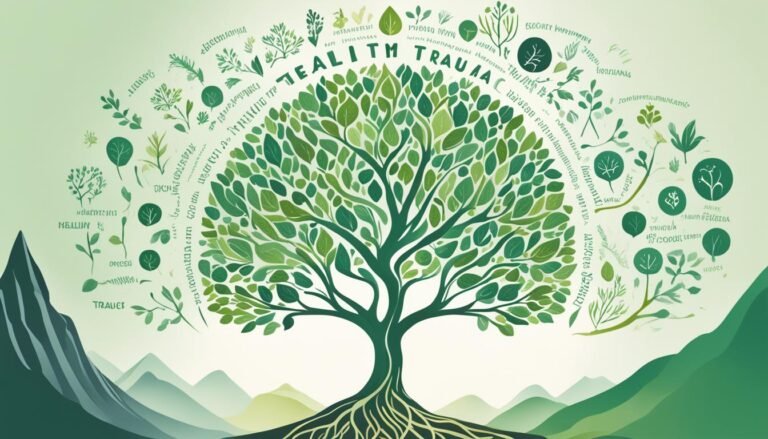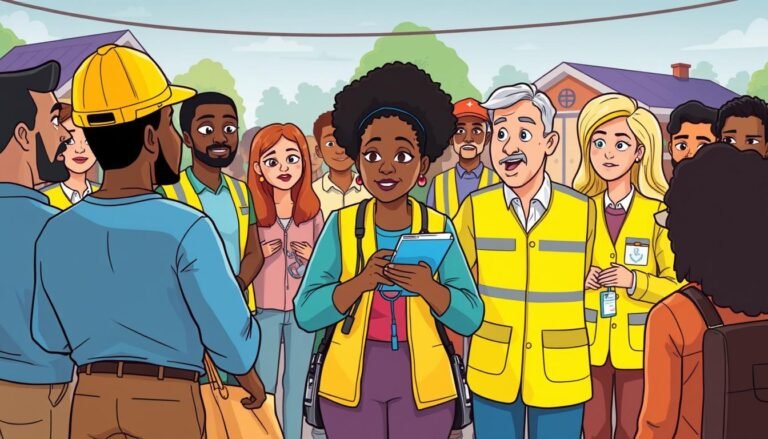Combating Stigma and Fostering Open Conversations About Mental Health in Ireland
Picture a cool evening in Dublin. Families and friends are at Merrion Square under the soft streetlight glow. Everyone’s talking and laughing. But, beneath this joy, the spotlight on mental health awareness shines bright.
In 2024, Ireland is changing how it views mental health. Progress has been good, but stigma remains. This stigma turns struggles into signs of failure or weakness. But, talking and understanding each other can build new strength. Together, we change what support means.
Key Takeaways
- Significant progress has been made in raising awareness about mental health issues in Ireland.
- Challenges persist, with many individuals facing judgment in institutional settings such as workplaces and schools.
- National campaigns and educational workshops are essential in increasing understanding and reducing stigma.
- Prominent figures and organizations emphasize the importance of starting conversations to combat mental health stigma.
- Intersectionality plays an important role in shaping individual mental health experiences, acknowledging social factors like race, class, and gender.
- Legislation and adequate funding are crucial for creating accessible mental health services and protecting against discrimination.
The Current Landscape of Mental Health in Ireland
In Ireland, the issues around mental health are changing. There’s been progress, but also some things that hold us back. It’s important to know both the good and the bad to make mental health awareness better.
Historical Context
Ireland has had its share of mental health struggles over the years. People often kept mental health issues a secret because of shame and old beliefs. This made it hard for many to find help. Our past has a big impact on how we think and talk about mental health today.
Recent Developments
Thankfully, making mental health awareness stronger is a big focus now. There’s a new plan that lays out how we can do better over the next 7-10 years. Lots of people helped make this plan, including those who use the services, their families, and the workers. It says we need mental health services that are easy to use for everyone.
This new plan also says we need to make sure there are enough services for everyone. It wants to see more teamwork among people who help with mental health. The idea is to have services right in the community and they should meet the personal needs of each person. They also want to make sure that everyone has a chance to get better.
Persistent Challenges
There are still many challenges to face, though. One tough problem is the lasting stigma around mental health. People still deal with judgment at work or school. Even though more people know about mental health now, getting rid of these bad beliefs is hard work.
There’s also not enough money or professionals to help everyone who needs it. People are starting to talk about how things like race, money, and gender affect mental health. But, we need to do more to make sure everyone gets the help they need in a way that works for them.
So, even with progress in mental health policies and programs, there’s lots we still need to do. Tackling these challenges is a job for all of us, together.
Understanding the Stigma Around Mental Health
In Ireland, the stigma on mental health is a big obstacle to open talks and giving needed support. People often wrongly link mental health problems with being a personal failure. This wrong idea really hurts people who need help. We will dig into why these beliefs are still around and their effects.
Deeply Entrenched Beliefs
The stigma around mental health is hard to change. Many think having a mental illness means you’re weak or not good enough. These unhelpful ideas are passed on from one generation to the next. This makes changing how society views mental health tough. Even with efforts like Shine Ireland’s Green Ribbon campaign, changing minds is still an uphill battle.
Impact on Individuals
For many in Ireland, the mental health stigma is more than just a social issue. It’s a matter of life and death. In 2020, there were 421 suicides, almost three times more than road accidents. The suicide rate has continued to climb, highlighting the need to fight stigmas.
Organizations like Pieta House and Samaritans offer vital help. Yet, some people are scared to reach out because of fear. This fear can make their mental health worse. Events like Darkness Into Light are steps in the right direction. They bring people together, promoting emotional support.
To reduce mental health stigmas, we must keep working. Open talks and continuous support are vital. It’s important to challenge old, wrong beliefs. This will help us build a more understanding society.
The Importance of Intersectionality in Mental Health Discussions
Intersectionality helps us see how different identities like race and gender come together. They affect our mental health in complex ways. This approach gives us a better glimpse into the mental health gap and how culture influences it.
Race, Class, and Gender
Looking at mental health through intersectionality, we find big differences in groups. For instance, Traveller men in Ireland have much higher suicide rates compared to the general population. This shows larger issues they face.
The suicide rate among Traveller men is not only remarkably high but also indicates underlying systemic barriers related to race, class, and education.
To tackle these problems, we need to include intersectionality in how we plan public health. It’s essential for addressing the needs of all communities.
Cultural, Social, and Economic Factors
Our culture, social settings, and money play key roles in our mental well-being. For example, Irish Travellers struggle with limited education and jobs. This shows how social structures affect their mental health. The Cultural Impact on Mental Health for marginalized groups underscores the necessity of culturally competent mental health services.
Bringing together these viewpoints in mental health work helps everyone. It makes our efforts to improve mental health more understanding and fair. This way, we create a society that’s more just and caring.
National Initiatives and Movements
National Mental Health Advocacy Campaigns are key in Ireland’s fight against stigma. They use real stories to make mental health issues more known. By sharing stories, many people help us understand and care more.
The Media plays a big role in shaping how we see mental health. Blogs and other platforms give people a voice to share their stories. This helps a wide range of people to connect and understand each other. It fights against the idea that mental health is something to hide.
The Role of Personal Narratives
Personal stories are crucial in mental health campaigns. They make the problems seem real and not distant. For example, the Green Ribbon campaign uses people’s stories to start important talks and build understanding.
Research shows that being positive can protect against depression. So, sharing stories can make us more healthy mentally. It builds a space where everyone feels supported and included.
Influence of Blogs and Media Platforms
Blogs and media give voices to people who are often ignored. They combine personal stories with facts to educate the public. This fights against stigma by opening up about mental health topics.
Programs like See Change use media to change how we talk about mental health. They get others to tell their stories to make talking about mental health more normal. These stories help those in need find comfort and push for big changes in our society.
Challenges Within Institutional Settings
In Ireland, places like work and school try to fight mental health stigma. Even with good ideas, they often struggle to make them work well.
Workplaces
Workplaces are key to supporting mental health. But, they find it hard to put good plans into action. Many young workers, around 35% from IEEE Photonics Society, deal with mental health issues. Groups like Dragonfly Mental Health (DMH) help a lot. They have over 150 volunteers all around the world. They work with IEEE to provide special programs on mental health and to fight topics like imposter syndrome.
Schools
Schools are very important in changing how we think about mental health. Learning about mental health at school helps lessen the shame from a young age. But, schools need more help. Teaching about “Breaking the Stigma from Within” and “Intersectionality and Mental Health” is crucial. It’s important to have mental health experts at schools too. They can make sure students get the support they need. Doing anonymous surveys at schools can also improve how mental health is taught.
We need to work hard in both workplaces and schools to end the stigma around mental health.
The Role of Legislation in Combating Stigma
Legislation is key in fighting mental health stigma in Ireland. It’s important to push for laws that stop stigma and make sure there’s enough money to help those struggling. It is vital for people facing mental health challenges to get the support they need.
Although mental health laws are more talked about, they still need better implementation. Making sure people with mental health concerns are not discriminated against and that there’s enough money for mental health are top priorities in Ireland.
Protecting Against Discrimination
Ending discrimination is crucial to breaking down social stigmas. Laws should aim to:
- Push for laws that protect against discrimination related to mental health issues.
- Make sure people with mental health challenges can get jobs, healthcare, and go to school like everyone else.
- Improve public messages to encourage healthy body image and social understanding, rather than just weight.
Putting warning labels on changed pictures in ads might not help as much as we hope. This is why we need more real and inclusive ads. These real ads are crucial to helping everyone feel accepted.
Ensuring Adequate Funding
Getting enough money for mental health in Ireland is also very important. Good funding allows for:
- Setting up programs in schools and classrooms to help kids feel better about their bodies and themselves.
- Supporting therapies like Cognitive-Behavioral Therapy that can really make a difference, especially for those with long-term illnesses.
- Teaching healthcare workers better ways to care for those with mental health issues and lessen the stigma.
Therapies like Cognitive-Behavioral Therapy can help right away and in the long run with mental health worries. They are very important.
Dance and movement therapy are also great for understanding our bodies and feeling good in general. They are especially helpful for those with learning challenges and autism.
To wrap up, good mental health laws and proper funding are critical to fighting stigma. They are key to a happier, more welcoming Ireland for everyone.
Combating Suicide Stigma: Case Study of Darkness Into Light
The campaign called Darkness Into Light is a big source of hope in Ireland. It tackles the tough issue of suicide stigma with power. Run by Pieta House, it tells us how important community support is for mental health.
Research keeps showing us the big mental health challenges people face. It’s so key to see how working together can help us all get through hard times. This is why community support for mental health is a big deal.
Impact and Reach
The Darkness Into Light Campaign has really taken off over time. It’s not just big in size but also in the way it helps people understand mental health issues better. A lot of folks who need help might not get it early. Yet, by talking and joining in with others who care, the campaign hopes to change that.
Community Involvement
This campaign shines a light on how important community is for mental health. In many places, people come together to stand against suicide stigma. Everyone joins in, from all parts of life, showing how much they care.
Saying with your community can really help you feel less alone and less sad. That’s what Darkness Into Light is all about – giving people a safe place to connect and talk. This is especially needed now, with some jobs being harder on mental health than before.
Conclusion
Ireland is moving ahead in the fight against mental health stigma. It’s vital to have open talks and strong support. The country is making big steps. But, the journey to be free of stigma is not over yet. It needs constant work from everyone.
To battle stigma, education and speaking out are key. Laws that help are also very important. These things can make our communities more caring and kind.
The stats show we need to act. Many people are affected by mental health problems. Families and adults both face these challenges. We must act in ways that respect different cultures. Efforts like Family Talk have helped. But, we must also overcome problems like limited services and those caused by COVID-19.
To make Ireland free of stigma, good talks and support are crucial. We need to listen to what different people need. By starting great mental health programs and helpful laws, we can make everyone feel safe to get help. This challenge needs all of us to work together. Together, we can make a place where no one is afraid to talk about their mental health.
FAQ
How has mental health awareness evolved in Ireland?
In 2024, Ireland is making big strides in mental health awareness. While progress is notable, some barriers and stigma still stand. Talking about mental health was once taboo. However, efforts are ongoing to change this narrative. There’s work to do in shifting deep-seated views.
What are some of the deeply entrenched beliefs about mental health in Ireland?
Mental health issues in Ireland are often seen as a sign of personal weakness. This attitude can harm individuals. It leads to a culture where people stay silent and feel misunderstood. It also stops them from reaching out for help.
How does intersectionality play a role in mental health discussions in Ireland?
Intersectionality matters in Irish mental health debates. Things like race, gender, and wealth mix with mental health issues. They shape how people see and deal with mental health. It’s important to include all these viewpoints for better policies and support.
What national initiatives are in place to combat mental health stigma in Ireland?
Ireland has launched national campaigns to lessen mental health stigma. Activities include sharing personal stories and using media. The Darkness Into Light campaign by Pieta House has been key. It shows the human side of mental health struggles. It builds empathy through real stories and community activity.
What are the challenges within Irish workplaces and schools regarding mental health?
Workplaces and schools in Ireland still struggle with mental health stigma. Some policies are in place, but they often don’t make a real impact. We need more mental health experts involved in schools and workplaces. This will help ensure real changes and promote open discussions.
How does legislation contribute to combatting mental health stigma in Ireland?
Legal actions play a big role in fighting mental health stigma. Advocates work to make laws that prevent discrimination. This includes ensuring there is enough money for mental health services. But it’s also vital to spend this money wisely and hire trained professionals.
What impact has the Darkness Into Light campaign had on mental health awareness?
The Darkness Into Light campaign has greatly influenced how Ireland deals with suicide. It’s a strong community effort. It helps make mental health a topic people can talk about with care. This campaign encourages everyone to learn more and join in. It’s key in building strong communities and linking people with helpful services.
Source Links
- Navigating Mental Health Stigmas in Ireland in 2024: Toward Understanding and Breaking Barriers
- Campaign to raise awareness on mental health stigma launched
- ‘Hello, How Are You?’: Fostering real connections and mental health support in communities – Hospital Professional News
- Mental Health – A Vision for Change
- Fortifying the Foundations: A Comprehensive Approach to Enhancing Mental Health Support in Educational Policies Amidst Crises
- Irish Mental Health Social Movements: A Consideration of Movement Habitus | Request PDF
- Breaking the Silence Speaking HOPE to Ireland
- Using an Intersectional Approach to Explore the Lived Mental Health Experiences of Traveller Men Affected by Suicide in Ireland
- NonProfit Partners Shed Light on Intersectionality for Black History Month – accessiBe
- It’s not just in my head: An intersectional, social and systems‐based framework in gender and sexuality diversity
- Mental Health Prevention and Promotion—A Narrative Review
- Fostering Wellbeing And Positive Mental Health Conversations
- Rewrite Your Story: Let Go of Mental Health Stigma and Shame
- Stigma, mental illness & ethnicity: Time to centre racism and structural stigma
- How can we protect, promote, and maintain body image?
- Evidence for eliminating HIV-related stigma and discrimination — Guidance for countries to implement effective programmes to eliminate HIV-related stigma and discrimination in six settings
- World Alzheimer Report 2012: Overcoming the stigma of dementia
- Original research: Mental health and help seeking among trauma-exposed emergency service staff: a qualitative evidence synthesis
- Guys’ intellectual health awareness (1).pdf
- The Family Talk Programme in Ireland: A Qualitative Analysis of the Experiences of Families With Parental Mental Illness
- Addressing the Mental Health Crisis in Schools Support Systems and Interventions.pdf








